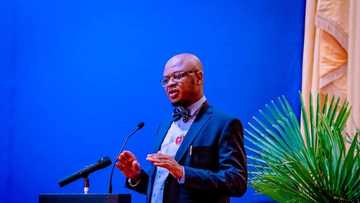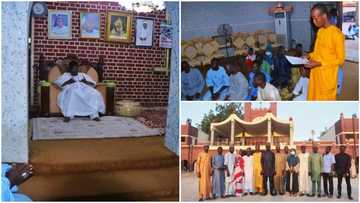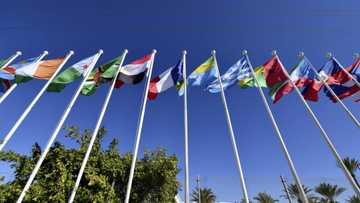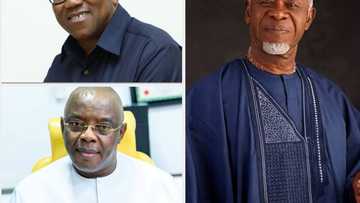Meet Nigerians and Africans Leading Top Global Institutions
- Several Nigerians and Africans are making a tremendous impact on international organisations
- Many of them are leading in healthcare, finance and trading, serving as beacons for other Africans
- Be it in the World Bank or IMF, these men and women have surmounted the odds to emerge tops
PAY ATTENTION: Click “See First” under the “Following” tab to see Legit.ng News on your Facebook News Feed!
Africa is now a pool of knowledge, talent and leadership and not of hunger, poverty and illiteracy as has been majorly portrayed by various Western media.
The continent is brimming with men and women who are leading top international institutions to achieve global goals in health, peace, trade, finance and equality.
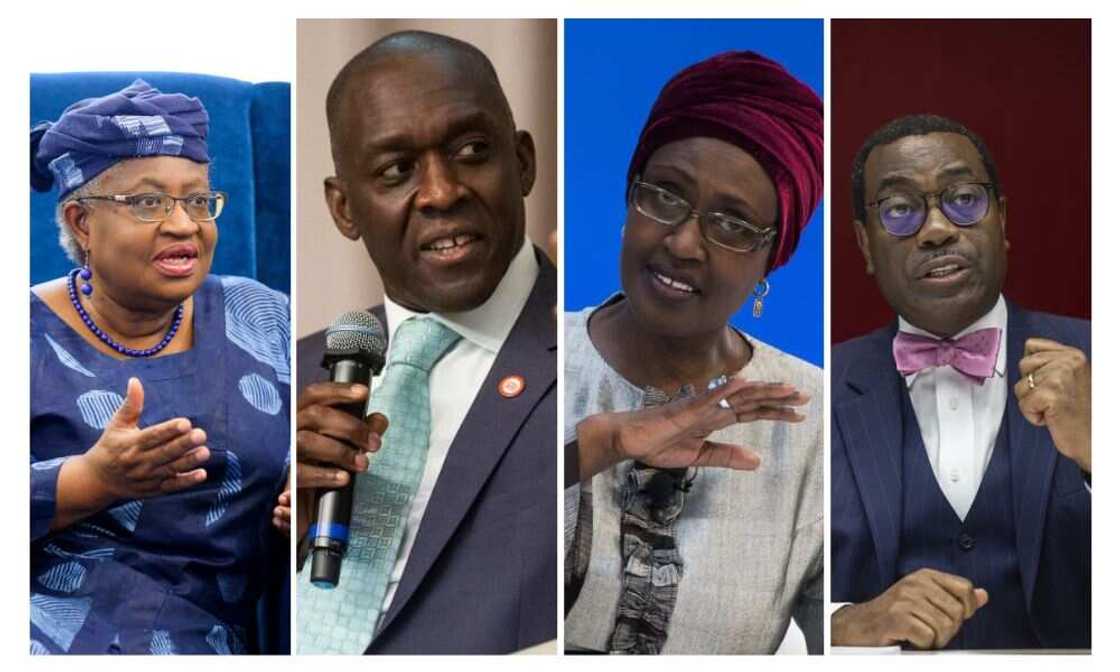
Source: Getty Images
These influential personalities are pointing the way for other Africans while providing solutions and initiatives in their various areas of endeavour.
1. Tedros Ghebreyesus: Director-General of the World Health Organisation (WHO)
At the peak of the COVID-19 pandemic, the world looked to the World Health Organisation for leadership and direction to wade through the global health scare.
PAY ATTENTION: Сheck out news that is picked exactly for YOU ➡️ find the “Recommended for you” block on the home page and enjoy!
The Ethiopia-born Ghebreyesus provided the much-required leadership for the WHO and the world.
Born in Asmara, an Eritrean city, Ghebreysus's parents are from the Tigray region in Ethiopia. He graduated from the University of Asmara with a degree in biology. He proceeded to the United Kingdom, where he obtained degrees in biology from the London School of Hygiene and Tropical Medicine, the University of London and the University of Nottingham.
He was Ethiopia's Minister of Health between 2005 and 2012, after which he became the country's Foreign Affairs Minister from 2012 to 2016.
He became WHO Director-General in 2017 and has proven resourceful in fighting off global health scares.
2. Ngozi Okonjo-Iweala: Director-General of the World Trade Organisation
The former Minister of Finance at various times in Nigeria made headlines in March last year when she emerged as the first woman and first African to lead the World Trade Organisation.
Born into a royal family with both parents as professors, Iweala studied at the International School Ibadan, went to the US to study Economics at Havard, and graduated with honours.
She earned a PhD in economics and development at the Massachusetts Institute of Technology.
The former World Bank Managing Director ran to be the head of the institution and won.
She sits on the boards of Standard Chartered Bank, Danone Carnegie Endowment for International Peace and Twitter.
3. Makhtar Diop: MD/Executive Vice President of International Finance Corporation (IFC)
A renowned economic and social development leader, Makhtar Diop was named one of the 100 most influential Africans in the world.
Diop was appointed the Managing Director and Executive Vice President of the International Finance Corporation (IFC) in 2012.
The IFC is a member of the World Bank Group, advancing the economic development and improvement of the lives of people by encouraging the growth of the private sectors in emerging markets.
Before his appointment, Diop was World Bank's Vice President for Africa Region for six years. He presided over a significant expansion of the bank's work in Africa and the delivery of $70 billion commitments to the continent.
The Senegalese-born national was a former minister of Economy and Finance and began his career in banking before joining the IMF and later the World Bank.
4. Winnie Byanyina: UNAIDS Executive Director
Business Insider reports that the Ugandan-born Winnie Byanyima is an aeronautical engineer and the present Executive Director of the Joint United Nations Programme on HIV and AIDS (UNAIDS).
She became UNAID's head in 2019 and served as Executive Director of Oxfam International between 2013 and 2019.
5. Antoinette Sayeh: Deputy Managing Director of IMF
The Liberian is an economist and the current Managing Director of the IMF.
According to records, Sayeh has worked with the IMF since 2006 and previously held the position of IMF's African Department and served as Liberia's Minister of Finance under ex-president Ellen Sirleaf.
She holds a PhD in International and Economic Relations from Fletcher School of Law and Diplomacy.
6. Akinwumi Adesina: President of Africa Development Bank (AfDB)
Akinwumi Adesina is a Nigerian economist currently serving as President of the Africa Development Bank (AfDB).
Akinwumi was Nigeria's Agriculture and Rural Development Minister. He was Vice President of Policy and Partnerships for the Alliance for Green Revolution in Africa.
He was elected AfDB President in 2015 and won re-election in 2020. He is the first Nigerian to hold the position.
Adesina served as Senior Economist at the West Africa Rice Development Association in Bouake, Ivory Coast. He also served at the Rockefeller Foundation after winning a fellowship from the Foundation as a senior scientist in 1988.
Former UN Secretary-General Ban Ki-moon appointed him as one of the 17 global leaders to lead the Millennium Development Goals.
Nigeria missing as 15 best-performing Central Bank governors in Africa are revealed
Legit.ng reported that a new report on the performance of bank governors, the Central Banker Cards, published annually by Global Finance, ranks the central bank governors of 101 key countries and territories as well as the European Union, Eastern Caribbean Central Bank, the Bank of Central African States, and West African Central Bank states.
For the 2022 report, just three central bank governors from Africa made the top 20 global list.
Business Insider reporting said that Lesetja Kganyago of the South African Reserve Bank, Havesh Kumar Seegolam of Mauritius, and Abdelattif Jouahri, of Morocco.
Source: Legit.ng


